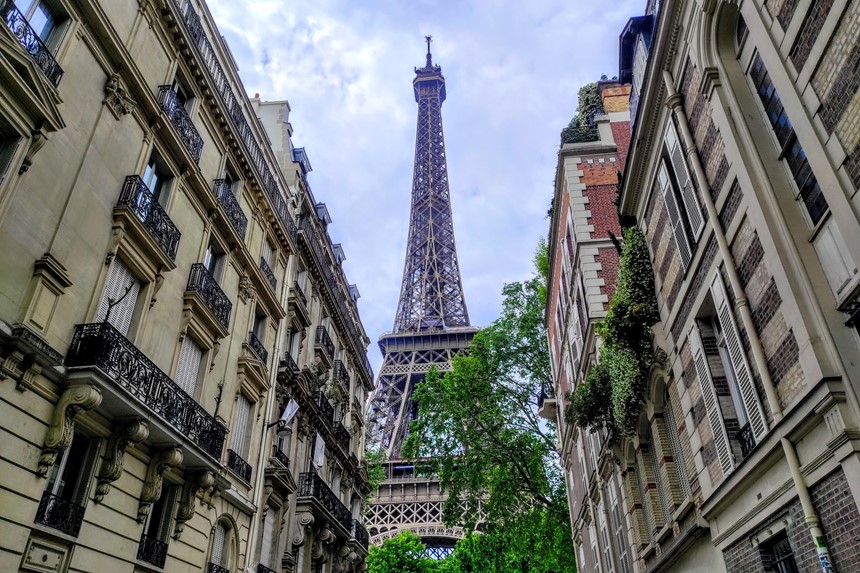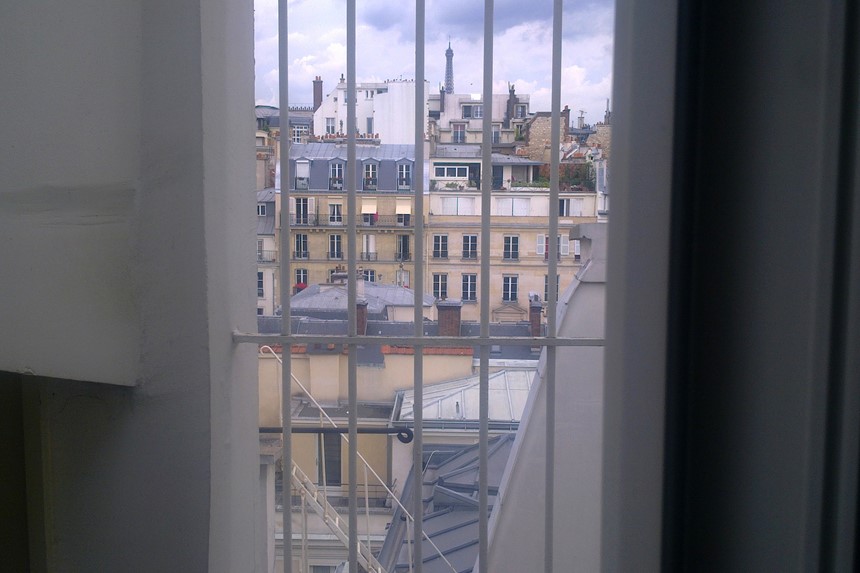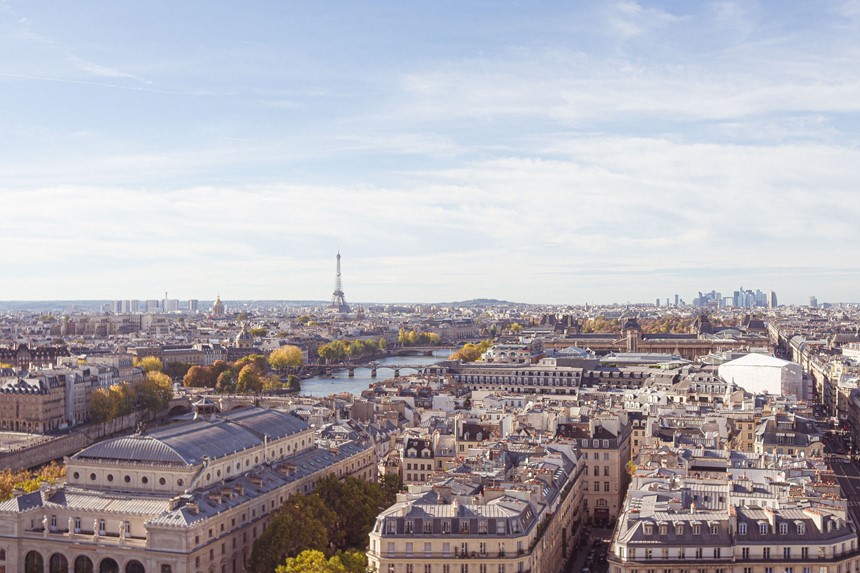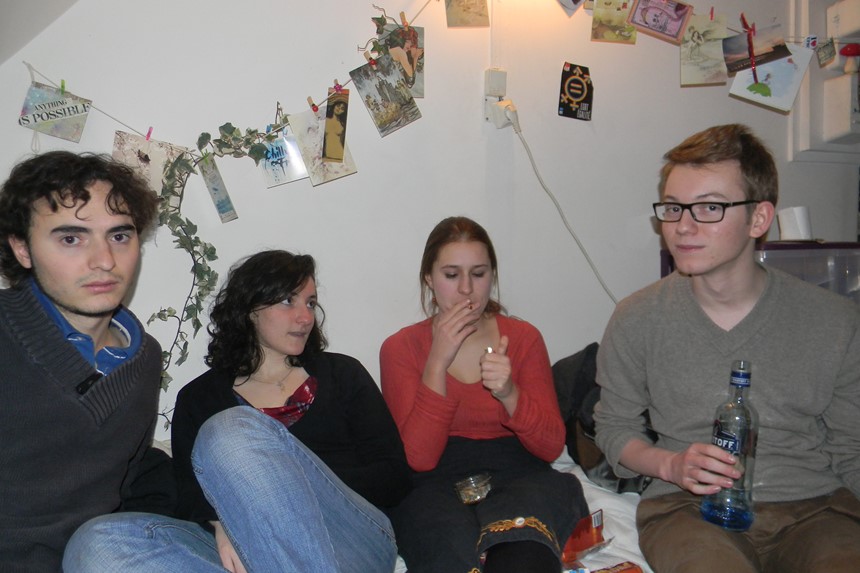
When Eloise Stark moved to Paris, she found a home amidst the opulence of Saint-Germain-des-Près. Hidden away, that is, in the servants’ quarters of her aloof bourgeois neighbours.

When Eloise Stark moved to Paris, she found a home amidst the opulence of Saint-Germain-des-Près. Hidden away, that is, in the servants’ quarters of her aloof bourgeois neighbours.
I hover on the corner of the street, checking that no one is around. I know I look out of place in this chic neighbourhood with my scuffed Doc Martens and bulging bags of Lidl groceries. I slip over to the door, which is flanked on either side by stone busts holding up the arched doorframe. They look down on me dolefully as I punch in the digicode and tip-toe inside. The heavy oak door slams shut behind. Damn. Did they hear? No one seems to stir on the floors above me. I glide past the spiralling marble staircase over to the second set of stairs, tucked away in the corner behind a small door that merged into the wooden panelled walls. I climb to the top and wind my way down the corridor to my front door.
This is where I live, in the middle of Saint-Germain-des-Près, hidden in the attic of Paris’ wealthiest. Few of the visitors to the city realise, as they walk the streets below, that there lies a secret world on the top floors of the Haussmanian buildings, a network of tiny rooms that used to make up the servants’ quarters, and are inhabited, today, by those who cannot afford to live elsewhere.
'Few of the visitors to the city realise, as they walk the streets below, that there lies a secret world on the top floors of the Haussmanian buildings, a network of tiny rooms that used to make up the servants’ quarters, and are inhabited, today, by those who cannot afford to live elsewhere.'
I collapse onto my bed and start putting my shopping away. One advantage of living in such a small studio: I can touch all four sides of my room without leaving my bed. Another: out of my skylight, I can see the Eiffel Tower.
Right now, it must be exactly 8 pm, because it is illuminated. From nightfall, the Eiffel Tower sparkles every hour on the hour, like a thousand shimmering stars. I love seeing it like this. Somehow it makes the entire monument look like a keyring replica of itself. Although maybe that’s just because I had a light-up Eiffel Tower keyring for years. I never dreamt that I would one day hang it on my own keys to one of the city’s most luxurious, bourgeois buildings.
Image courtesy of Eloise Stark

Image courtesy of Eloise Stark

In 2011, when I found out I had been admitted to Sciences Po, one of France’s top universities, I was over the moon. The hellscape of searching for accommodation to fit my student budget had brought me crashing back down to earth.
There was an apartment that was in the basement below the basement, a dingy room with a lightbulb hanging from the ceiling and no running water. A bargain at just 400 euros a month. Then I visited a place marketed as a “triplex”, a three-floored apartment. None of the three floors had enough space for a bed. It wasn’t an apartment so much as a stairwell. Then there were all the dodgy advertisements offering accommodation in exchange for “services”. Often these were guys with one side of their bed to spare, and a strong desire to take advantage of precarious young women.
Image courtesy of Dimitri Iakymuk, Unsplash

So understandably, when I rocked up for my next apartment visit, my expectations were low. As low as that basement under the basement. I stood in shock when I saw the building, with its ostentatiously carved door and gilded balconies. An old woman came out to greet me. Her red lipstick looked startling on her white crepe-paper skin. “Bonjour, bienvenue. I’m Georgette.” Her entire body shuddered with Parkinson’s disease, but she managed a kind smile and a handshake. She led me into the entrance hall. “My family has owned this apartment for generations. We don’t need the servants’ quarters now, of course” she said. “It’s very small. But for a student, I think it is good.”
I followed her into the see-through lift, which ascended slowly through the helices of the staircase. “If you live here, you shouldn’t use the lift”, she said. “It’s not for the people of the top floor, they should use the servants’ staircase.” The lift reached the sixth floor, and Georgette got out first. She opened a door, disguised in the wooden panelling, which brought us out onto the servants' staircase. We climbed another floor, to arrive at my future home. It took only a few seconds to take it all in. The bed, squashed in next to a small wardrobe and a desk. The tiny kitchen which blocked the front door from fully opening. “I’ll take it,” I said. “Tres bien.”
She led me down to her apartment to sign the contract. It occupied the entire second floor of the building, and my mouth fell open as she opened her door to reveal a beautiful living room of wooden panelling and antique furniture. Above us was a ceiling rose almost as elaborate as the chandelier hanging from it. “I’ll fetch the contract for us to sign,” said Georgette. I walked over to the oil paintings covering the walls. On one side were tiny portraits, and when I looked closer I saw that they showed Napoleon. “They’re originals, of course,” said Georgette, who had returned, holding a piece of paper. For a second, I was filled with jealousy, seeing her tiny frame in this huge apartment surrounded by priceless antiques and relics of history. Then she came down with a particularly violent bout of shakes. The contract fell to the floor, I rushed to pick it up, and our eyes met. I was too slow to hide the pity in mine. She looked away. “Remember, access is via the servants’ staircase, only,” she said primly. “This is a nice building. We don’t want you and your friends partying over here. Make sure to be discreet.” A little of the friendliness had gone from her voice, as she waved me out of her world.
'If you live here, you shouldn’t use the lift”, she said. “It’s not for the people of the top floor, they should use the servants’ staircase.'
I assumed that “discreet” meant no parties. But after some interactions with my neighbours from the lower floors, I realised that it wasn’t my noise they resented, but my very presence. They glared at me when we happened to cross paths in the hall, and never returned my greetings. I once arrived with a heavy bag of groceries, and one neighbour, standing in the open elevator, looked me straight in the eyes as he pressed the “close doors” button and began to ascend.
On my floor, however, everyone was friendly to one another. We saw each other often, as we shared a shower and a toilet in the hall. There was the musician who played clarinet all day, occasionally swapping to the ocarina at night. There was a couple in their fifties who walked around the corridors stark naked, occasionally conducting their arguments in the same way. There were four guys from Bangladesh, barely older than me, that shared two sets of bunk beds in one tiny room. They started work in the evening, selling roses in the streets. They called me “lady” and once brought me over samosas.
I soon realised the magic of this place, this last pocket of resistance in a rapidly gentrifying city. In the servants’ quarters lived the bohemians, artists, students and immigrants that made Paris what it is. There we were, trying desperately to hold on to a city that didn’t seem to want us anymore.
'In the servants’ quarters lived the bohemians, artists, students and immigrants that made Paris what it is. There we were, trying desperately to hold on to a city that didn’t seem to want us anymore.'
Image courtesy of Eloise Stark

Dutifully avoiding the lower floors, my only contact with my posher neighbours was the occasional sighting of a fur jacket in its natural habitat: stepping into a chauffeured car outside the building. I was surprised when, one day in June, I entered the hallway to find not one but two of them, chatting by the letterboxes. Both held stacks of invitations on which I could make out the words fête des voisins. The fête des voisins, or party of the neighbours, is a day in France where neighbours come together for drinks and snacks. Except that those invitations never made it into the letterboxes of our floor. The next week, the rich neighbours set up a table outside and shared champagne and turned their eyes away when any of us passed. I complained to my nudists next door who smiled, shook their heads and said: “it’s the same every year.”
I got my petty revenge by holding a raucous party in my flat. Eight of us squeezed in to drink cheap wine before passing out in a Tetris of bodies on the bed, floor and desk.
A few months later, tensions rose once more. It was the middle of December and the streets of Paris were covered in snow. The walls of the shower were covered in black mildew. This seemed to particularly upset the man who owned the floor below. He started standing guard in front of the shower room, yelling at everyone who went in to leave the window open. And then one day, he was gone. And so was the window. Ice had formed on the floor. Each shower was a battle between the hot water and the cold air.
This created a fair amount of chuntering amongst the motley crew of attic-dwellers. People taped up the window. They started making noise. They even took the lift. But the acts of resistance remained small and sly. None of us wanted to anger our landlords and lose our accommodation. Losing these rooms meant leaving Paris entirely, and we all loved Paris dearly even though it seemed she no longer had space for us.
I only stayed a year in my maid’s room in the attic, but it will stick in my memory. I bore witness to a time in Paris’ history that will be short-lived. Property developers are already snapping up the maids' rooms. They break the walls down. They turn them into decent-sized apartments which appeal all too well to hipsters and their aesthetic of urban poverty. The knowledge that these were once the servants’ quarters is seen as poetic, rather than depressing.
The parallel world that emerged in the attics will disappear. The eccentric inhabitants will move out of the city, beyond the Périphérique. And Paris may find itself losing the spirit of bohemianism, youthful idealism and hopefulness that make it the city it is.


